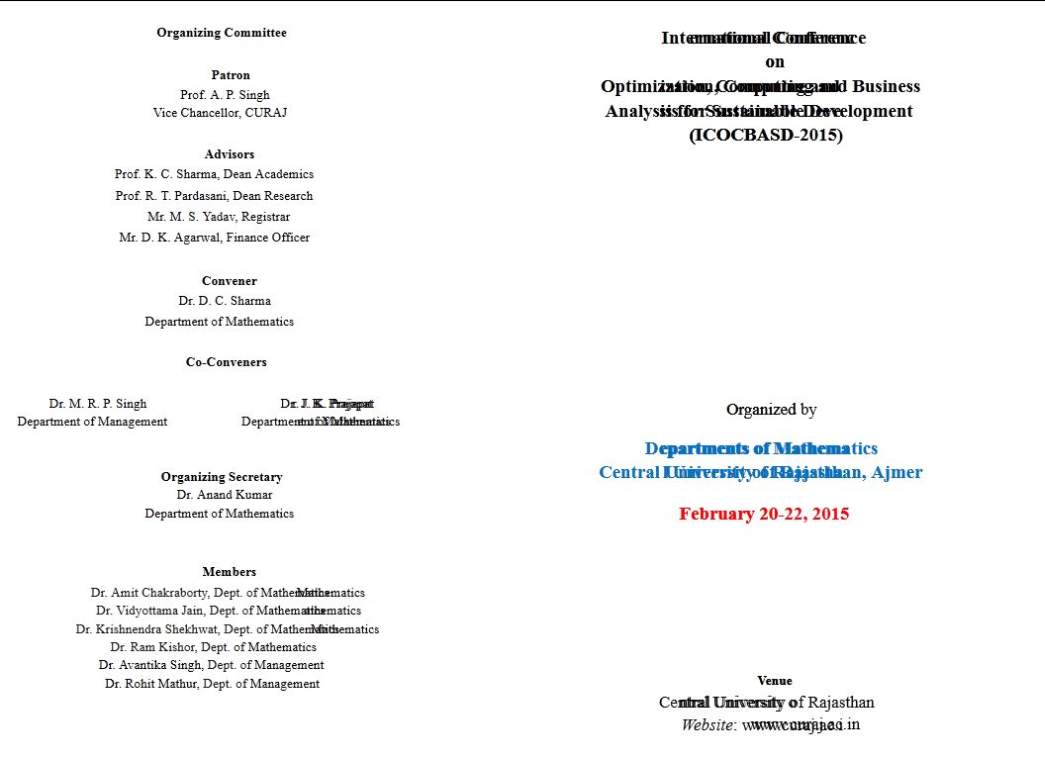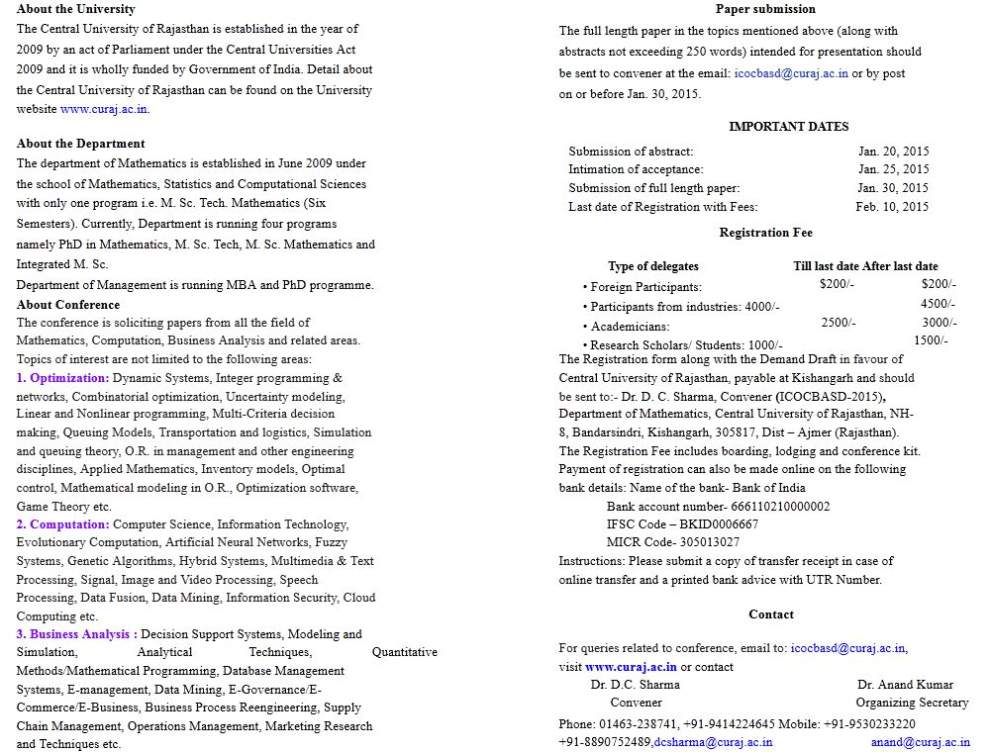|
#2
13th September 2015, 09:40 AM
| |||
| |||
| Re: Central University of Rajasthan placement
As you want to get the details of placements of MBA and the syllabus of Central University of Rajasthan so here is the information of the same for you: Placement Brochure:   Syllabus: Semester 1: Principles & Practices of Management Managerial Economics Accounting for Managers Business Mathematics Business Statistics Business Communication (L-2) Soft Skills (P-1) Organization Behaviour Entrepreneurship Semester 2: Marketing Management Human Resource Management Financial Management Production & Operations Management Information Systems (L-2) Practical (P-1) Business & Economic Environment Management of New Ventures Operation Research Semester 3: Strategic Management International Business Managerial Econometrics Summer Internship Elective Group-1: Marketing Marketing of Services Sales & Distribution Management Integrated Marketing Communication Marketing Models Elective Group-2: Finance Management of Financial Services Security Analysis and Portfolio Management International Financial Management Financial Institutions & Markets Elective Group-3: HRM: Human Resource Planning & Development Strategic HRM Industrial Relations and Labour Law Compensation Management Semester 4: Business Laws Business Ethics Business Forecasting & Planning Techniques MBA Project Elective Group-1: Marketing Retail Management Consumer Behaviour Product and Brand Management Global Marketing Elective Group-2: Finance Corporate Tax Planning Financial Engineering Financial Econometrics Strategic Financial Management Elective Group-3: HRM Conflict Management Organisation Development Psychometric Global HRM Detailed Syllabus MBA 101 Principles and Practices of Management Objective: The objective of this paper is to familiarize the students with basic management concepts and behavioural processes in the organisation. Unit I Management an Overview, Definition, Functions of Management, Managerial Roles and responsibilities, System and Contingency Approach for understanding organizations, Management Thought-Classical Perspective, Scientific Management, Administrative Management, Bureaucratic Management, Behavioural Perspective. Skills and Roles of Manager in an organization, Social Resrtponsibilities of Business. Unit II Fundamentals of Planning, Types of plans, Policies & planning premises, planning process, the nature of objectives & process of MBO, Decision making (nature, process & techniques, models, groups and its decision making). Fundamentals of Organizing- Nature and purpose, Elements and process of organizing, Basic departmentation, Span of Management, line and staff concept, centralization and decentralization, Delegation of authority, Determinants of organization structure, New approaches in organization design, downsizing and its implications, organizational climate, organizational creativity and innovation. Unit III Direction-concept, its significance and main elements, Coordination (importance and techniques), Leadership - Meaning and Importance, transitions in leadership theories, trait theories, behavioral theories, contingency theories, leadership styles and skills, Managerial culture and leadership, Motivation – its concept, nature and theories. Communication – meaning, concept, process types and barriers to an effective communication. Unit IV Control- concept, nature, its process & importance, controlling techniques, control of overall performance, span of control, management control systems, behavioural implications of managerial control. Unit V Knowledge management, Total Quantity Management, Business process reengineering, Management of productivity, Comparative management in selected countries, International management and MNC’s, corporate governance, Management challenges. Case studies based on above-mentioned curriculum Suggested Readings: • Koontz & O’Donnel, Essentials of Management, • Weihrich Heinz and Koontz Harold, A Global and Entrepreneurial Perspective, 12th Edition, Mcgraw Hill • Stoner, Freeman & Gilbert Jr, Management Organizational Behaviour, 6th edition, PHI • Terry, G.R., Principles of Management • Peter F. Drucker, Management Task and Responsibility • MBA 102 Managerial Economics Objective: The objective of the course is to provide insights to the students regarding tools and techniques of economics to enable them to appreciate its relevance in business decision-making Unit I Meaning and scope of Managerial Economics, Role and responsibilities of Managerial Economist, Objectives of firm, Fundamental concepts of Economics - Incremental reasoning, contribution, Time perspective, Risk and uncertainty, Discounting principle, Opportunity cost, Profit maximization model, Growth maximization model and Behavioral model of firm Unit II Demand and revenue, Elasticity of demand its significance and its applications in business, Demand function, Determinants of demand, Demand forecasting, Cost concepts relevant to business decisions, Cost Functions, Production function, Laws of returns and returns to scale, Estimation of production and Estimation of cost. Unit III Theory of pricing, Perfect competition, Imperfect Competition, Monopoly, Monopolistic competition, Monopsony, Duopoly and Oligopoly Unit IV Pricing decisions, General theory of pricing, Peak load pricing, Pricing over life cycle of a product, Cost plus pricing, Multi-product pricing, Transfer pricing and Cost oriented prices Unit V National Income, its Components, Methods of measurement, Problems in estimating, economic welfare and industrial growth, The flat world economy, Characteristics of new economy, , Icons of new economy, Demographic dividend and Rules of the game in new economy . Case studies based on above-mentioned curriculum Suggested Readings: • Joel Dean, Managerial Economics • Paul A Samuelson, Economics, Mc Graw Hill International , New York • D.N. Dwivedi Managerial Economics, Vikas, New Delhi • N.D. Mathur,, Managerial Economics, Shivam Book Hous Pvt. Ltd, Jaipur • P.L. Mehta, Managerial Economics, Analysis and Cases ,Sultan Chand &Sons, N. Delhi • R.L. Varshney & K.L. Maheshwari, Managerial Economics, Sultan Chand &Sons, New Delhi • U.L. Mote, Samuel Paul and G.S. Gupta, Managerial Economics, Tata Mc Graw Hill, Mumbai MBA 103: Accounting for Managers Objective: The objective of the course is to understand the system of utilizing financial, costing, and other information to assist the management in the performance and evaluation of their functions. The Course will provide the students with a learning framework that will enable them to study the principles and procedures used in collection and analysis of accounting information. Unit I Introduction: Financial accounting, its Concept, Importance, Scope, Accounting as an information system, Accounting concepts, conventions and Generally Accepted Accounting Principles (GAAP) Unit II Financial statements: Preparation of financial statements-Trading account, Profit & Loss a/c, Balance sheet and Adjustments in final accounts. Unit III Management Accounting: Concept, Need, Importance and Scope. Nature, Attributes and Usefulness of financial statements, Distinction between financial accounting, cost accounting and management accounting, Role and responsibility of management accountant. Unit IV Cost accounting: Meaning - Cost, Cost accounting & cost centre. Elements, methods of costing, Preparation of cost sheet and inventory control. Unit V Marginal & Standard costing and budget recontrol, Marginal costing, Absorption costing, their difference, Concept and application of CVP analysis in business decision making, Standard costing, Variance analysis. Case studies based on above-mentioned curriculum Suggested Readings Basic reading: • Maheshwari, S.N. (2001). Management Accounting and Financial Control. Sultan Chand and Sons, New Delhi. • Bhattacharya, S.K. and Dearden, J. (1996). Accounting for Management: Texts and Cases. Vikas Publishing, New Delhi. Reference Books: • Wheldon : Cost Accounting and Costing Methods. • Homgren Charges I: Intorduction to Management Accounting. • Keller and Ferrara: Management Accounting for Profit Control. • Accounting for Managers: S.K. Bhattacharya & John Dearden. • Management and Cost Accounting: Robert S. Kaplan. • Advanced Management Accounting: Robert S. Kaplan. • Robert Anthony: Management Accounting. MBA 104 Business Mathematics Functions: Basic Concepts and Applications in Business. Break-Even Analysis – A Functional Approach. Arithmetic and Geometric Progressions in Business Vectors, Matrices and Determinants , Algebra in Solving Real Life Business Problems. Applications of differentiation in solving problems related to business and economics. Applications of integration to accounting, business and economic problems. Applications of differential equations. Mathematics of Finance I: Simple Interest, Compound Interest, Nominal and Effective Rates of Interest. Equation of Value. Mathematics of Finance II: (Annuities): Types of Annuities. The amount of an ordinary annuity. Deferred annuity, Leasing, capital expenditure and bonds. Readings J.K. Sharma, “Mathematics for Management and Computer Applications”, New Delhi, Galgotia Publication, R. K. Ghosh and S. Saha, “Business Mathematics and Statistics”, Calcutta, New Central Book Agency S. Saha, “Business Mathematics and Quantitative Techniques”, Calcutta, Central Book Agency, J. N. Kapur and H. C. Saxena. “Mathematical Statistics”, New Delhi, Sultan Chand and Company Ltd., R. Jayprakash Reddy and Y. Mallikarynna Reddy, “A Text book of Business Mathematics”, New Delhi, Ashish Publishing House K. B. Dutta, “Matrix and Linear Algebra”, New Delhi, PHI Learning For more detailed information I am uploading 2 word files which are free to download: Contact Details: Central University of Rajasthan NH 8, Bandar Sindri Ajmer, Rajasthan 305817 India [MAP]Central University of Rajasthan[/MAP] |
